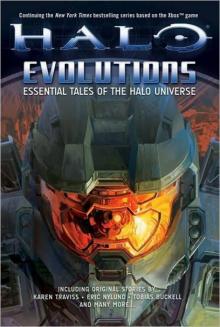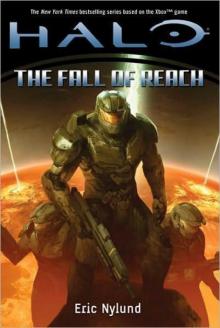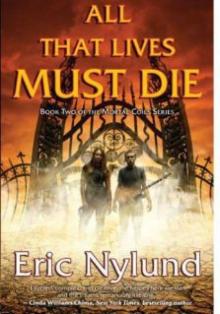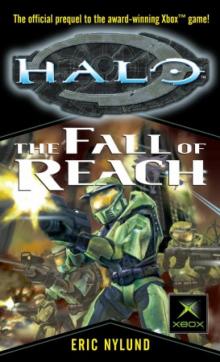- Home
- Eric Nylund
Halo: Evolutions - Essential Tales of the Halo Universe Page 4
Halo: Evolutions - Essential Tales of the Halo Universe Read online
Page 4
He tried to think that over, shook his head. He gestured at his legs, his gnarled hand. “What happened to me?” he asked.
“Your body reacted badly to the muscular enhancement injections and the thyroid implant,” she said. “Basically your muscles grew in ways and directions that we couldn’t predict and then tried to crush or twist the bones beneath them. We were able to use the carbide ceramic ossification process to stabilize and strengthen the bones and to stop it before it became too severe, but as you can see we had better luck with some limbs than others.”
She watched him and waited for him to say something. When he didn’t, she went on.
“Unfortunately, what that means is that there’s a constant tension between your muscles and bones. It’s like your body wants to tear itself apart. That may manifest itself as pain within the bone itself, as muscle pain, or as both. The pain may be intense, almost unbearable.”
“I know,” said Soren.
“With medication, the pain will be bearable. Some of us believe that as your body adjusts to its new state that the pain might diminish or go away entirely.”
“Is that what you believe?” asked Soren.
“Do you want me to be honest?” Dr. Halsey asked.
“Yes,” said Soren.
Dr. Halsey sighed. “No,” she said. “I think the pain will diminish but I don’t think it’s likely that the pain will ever go away.”
He nodded, his lips a grim line.
“On the other hand,” she said. “You’re stronger than even we imagined. The straps on the operating table were strong, with a titanium microweave through the cloth. They were over-engineered to hold any of the other Spartans in place, but they weren’t enough to hold you.”
They were silent a moment. “How many of us are left?” he finally said.
She shrugged. “More than half,” she said. “Almost half of you are dead. With another dozen or so, the modifications didn’t take.” She reached out and touched his arm again. “I’m sorry, Soren,” she said.
He refused to meet her eyes. “I made the choice,” he said. “I have nobody to blame but myself.”
A moment later she stood and, without a word, left. Soren stayed where he was sitting on the floor, staring.
SIX
___________
A week later he was out of the brig, released on his own recognizance. Some of the other Spartans, he saw, were in as bad or worse shape than he. Fhajad had uncontrollable muscle spasms and was confined to a wheelchair. René and Kirk had had the same difficulty that he had, but their bones were so twisted and deformed that they were now floating in gel tanks, unable to move on their own. A few others were even worse, kept in isolation chambers, comatose and always on the verge of death. Somehow he didn’t find it comforting to think that their fates had been worse than his own.
After a few weeks the pain seemed to have diminished a little, though they kept him drugged enough that it was hard to say. The drugs did help with the pain but he hated the confusion they caused within him, the sense he had of having to plow through ideas, of not being able to finish a thought. That started to get as frustrating to him as the pain had been.
He slowly began to scale back the medication, palming a few of the pills each time he was given them, then more and more. The pain was strong and intense, but definitely slightly less than when he’d first awoken. He found he could stand it. I can live with the pain, he tried to tell himself. What I can’t live with is not being able to think. Sometimes, though, he would make an imprudent twist or just move wrong and find himself on the verge of passing out, his forehead beaded with sweat.
He kept at it. Everything felt rawer to him, but yes, he could stand it. His head was clearer in a way, though the pain, like the drugs, could make it difficult to think. Still after a month he was palming all the pills, pretending to take them but instead taking them back to his room and dropping them into a drawer. In another two months, the drawer was almost completely full.
It was true that he was insanely strong. Early on, in a fit of frustration, he punched the wall in his room and was surprised when his fist tore through the metal panel as if it were thin plaster. He moved the bed so its post partially hid the damage and was careful from then on out.
It’s not hopeless, he started to think as time went on. He was stronger than he’d ever been—faster, too, despite his awkward gait. And even if his arms and legs had suffered somewhat he still had everything he needed to be an excellent soldier, better than any normal, unmodified human. I’m still a Spartan, he told himself.
BUT NOT everyone, he found, agreed. When he tried to report back for active duty, CPO Mendez took a long, hard look at him and then said, in a voice gentler than any Soren had heard him use, “Walk with me, son.”
They went down the hall together, an odd pair: Mendez straight and tall, his stride brisk and confident, Soren massive, but hunched and leaning, weaving as he went.
“Sweet William?” Mendez asked him, taking out a cigar.
Soren, looking surprised, shook his head.
“Ah,” said Mendez, after first biting off the ends, “sometimes it’s difficult for me to remember that you’re all only boys. Filthy habit, this. Don’t start it young.”
“Yes, sir,” said Soren.
Mendez got the cigar lit and sucked on it hard. The end glowed red and then ashed over, the smoke slowly oozing out of his nostrils. “I can’t do it, son,” he said.
“Can’t do what?” asked Soren.
“I can’t have you in active service.”
“But I’m strong,” said Soren. “I’m even stronger than the other Spartans, and almost as fast as some of them. I can keep up and I’m smart and . . .” Seeing the stern expression on Mendez’s face, he let himself trail off.
“Nobody doubts your courage, son. And I for one don’t doubt your ability. But if I put you in a team with the other Spartans, you know what’ll happen?”
“What, sir?”
“They’ll always be thinking about the ones who didn’t make it, the ones that died while they went on. They’ll feel a special obligation to look out for you and keep you alive that will affect their ability to perform. It’ll hurt their focus, keep them from having that edge when they really need it. Right now, without you, they all move and think in a similar way. They work like a well-oiled machine. But there’s something to be said for the symmetry they display, the instinctual camaraderie. You’re good, no doubt about that—hell, I could see that on the day you woke up and went apeshit—but being on a team with other Spartans just isn’t going to happen.”
“Respectfully, sir—”
“Plus body armor,” Mendez said. “It just won’t fit you. Plus the difficulty of firing a weapon with that hand. No,” he said, stubbing the Sweet William out on the floor. He reached out and put his hand on Soren’s shoulder, looked him straight in the eye. From his look, Soren suddenly could see how hard it was for Mendez to say all he was saying, that he wished things could be different. “I’m sorry, son. Just be patient and maybe something will come along for you. But this, this just isn’t it.”
“CPO MENDEZ is right,” said Dr. Halsey, just as he’d known she would. “He doesn’t mean to hurt you, but he has to do what’s best for the rest of the recruits and for the program.”
“But it’s not what’s best for me,” said Soren.
“Who says it isn’t?” asked Dr. Halsey. “It’s not what you want, but that doesn’t mean it’s not what’s best for you.”
“I want to serve,” he said. “I don’t want to be left behind.”
“I’m sorry, Soren,” she said. “You can’t serve in this way. You’ll be able to serve, but not in a combat position.”
“All I want is to be given the choice,” he said. “You always were willing to give me a choice in the past. Can’t you do it again this time?”
She shook her head. “I’m sorry, Soren. Not this time.”
SEVEN
___________
Later, when he thought back to it, he saw that as the turning point. It shut too many doors for him, damaging him, closing parts of him off. And it was stupid, he tried to tell himself. They should have used him, they should have figured out something specially suited for him and his uniquely deformed body. It wasn’t that he wasn’t as good as the other Spartans—even Mendez had had to admit that. In some ways he was better than them, stronger. Sure, his skin and his brain sometimes felt like they were on fire, but he was learning to control that, learning to get around it and even focus it.
They could have found something for him, something that fit him, but instead they strapped him with a desk job within the compound, an ordinary run-of-the-mill job that just about anybody could have handled. They said it was temporary, but as time went on, it felt more and more permanent. Barely sixteen and already retired from active duty, already a paper pusher. It was as if they hadn’t even tried to think of the right job for him. It was hard not to feel resentful.
Which was why, almost six months later, when one of the technicians—a fellow named Partch—began talking to him about revolution, instead of reporting the man he began to listen.
Partch started slow, just bits and pieces, hints. Sure, he said, the UNSC was much needed and important—we couldn’t live without them. But didn’t they sometimes come down too hard? Didn’t they sometimes do things that were carried out with the best of intentions but, when you looked at them closely, were just simply wrong?
“Like with you, for instance,” said Partch, once Soren had confessed what had happened to him. “Why aren’t they making proper use of you? Strong as a bear, quick, smart too: It’s a damned waste, if you ask me. Yet they’re still putting wet-behind-the-ears Marines right in the line of fire.”
At the time Soren didn’t respond, but later he couldn’t help but thinking that yes, it was a waste, Partch was right. Soon, it wasn’t just that he wasn’t reporting Partch: He’d started to search him out. He listened, very rarely revealing what he was feeling about what Partch was saying, but listening, listening. Finally one day he said, “So what can we do about it?”
Partch shook his head. “I don’t know,” he said. “It’s hard to know what to do to fix the system when it breaks. People are afraid of change; they’d rather limp on with a broken system than do the hard work of making a change. If you’re not careful, before you know it you’re labeled a terrorist.”
“But there must be something I can do,” said Soren.
“A guy like you,” said Partch giving him a sidelong look, “sure, there’s a lot you can do. But will you?”
“I think I would,” said Soren.
“Even if you knew that others might see you as a terrorist? Do you care more about what people think, or about doing what’s right?”
“I’ve never cared what people thought,” said Soren, lying.
Partch gave him an appraising look. “No,” he said. “I daresay you haven’t.”
IT WENT on like that for a long time, Partch talking and hinting, and Soren becoming more and more eager to take part. It was exciting, like he was part of something, like something was happening. As he heard news of the other Spartans, he needed that, needed to feel like he was involved. His allegiances changed almost imperceptibly until, almost before he knew it, he found himself on the side of the rebels. Yes, he began to think, the USNC was too powerful for its own good; it had become a big bully. Yes, the colony worlds had the right to function in whatever way they wanted, had a right to be independent from the United Earth government if they so wanted. It was crazy to think otherwise. Yes, he was eager to help, yes, and since that was the case, what was he doing here?
“Be patient,” said Partch. “We . . . they need people like you. But we have to wait for just the right moment. And let’s take someone along with us—something as a souvenir.”
EIGHT
___________
Partch had a card that opened the lock—whether he had stolen it or had been given it as part of his job, Soren did not know. Inside was some sort of geological research laboratory. On one metal table was a simple wooden box with a metal screen in the place of its bottom, a sealed plastic tub next to it. Here and there, loose on tables or bolted to the ceilings and the walls, were precision instruments, things mostly unfamiliar to Soren.
They went in, Partch setting the door to stay slightly ajar behind them.
“Why not close the door all the way?” asked Soren.
“I’m not sure the card will open it from the inside,” said Partch.
Stolen or rigged, then, thought Soren. Never mind, he thought, then recited in his head one of Partch’s lines: When the government goes bad, we all have to do things that we normally wouldn’t do until it’s back on the right track again.
“It’s the sixth cabinet,” said Partch. “I disabled the alarm this morning from my panel. And I’ve put in a loop for the AI to look at for the room and the hall. Not easy, if I do say so myself, and not something likely to last long. Do you think you can open it?”
“What’s in there?” asked Soren.
“Something important,” he said. “Something we need.”
Soren nodded, staring at the cabinet. It was made of a brushed metal, perhaps steel, the doors seemingly quite thick. He reached up and put his hand over the top edge, felt the door’s top lip, gave an exploratory pull. It didn’t move.
“I don’t think I can do it without a prybar,” said Soren.
Partch nodded, took a flat titanium-alloy bar, flanged at one end, out of his backpack.
“You came prepared,” said Soren.
Partch just smiled. Soren took the bar and forced the end of it in the slight channel between the two doors, grunting, barely denting the metal slightly to either side, working it in until it had gone as far as it’d go. Then, putting all his weight into it, veins popping out on his arms, he pulled.
For a moment Soren thought that even the crowbar would not be enough. He felt his arms burning, and a black hole began to open in his vision, the pain he always felt under the surface becoming reactivated by this new stress of muscle on bone. Then there was a creaking sound from the cabinet door and it buckled just a little around the lock.
He let up and forced the bar in deeper, and then bore down again. The door creaked again and buckled further, then this time came free. He handed the crowbar back to Partch who put it away, and then he opened the cabinet door fully.
Inside was a titanium case, about thirty centimeters long and fifteen wide, maybe ten centimeters deep.
“What is it?” asked Soren. “What’s inside?”
Partch just smiled. He was just reaching for it when they heard a voice from behind them.
“I don’t suppose you’d care to explain yourself,” it said.
Soren turned, his expression immediately going flat and neutral. It was one of the Spartans, not one that Soren had known well, someone he’d only rarely been teamed with before washing out. Randall, his name was. He wasn’t dressed in uniform or battle gear, was dressed down in a simple black T-shirt and loose gray cloth pants. His face was as neutral as Soren’s.
“Hello, Randall,” said Soren, thinking quickly. “Problem with this cabinet, with the lock mechanism. Sometimes it won’t lock, sometimes it won’t open.”
“I know you,” said Randall. “Soren, right? Used to be a Spartan. But you’re not a technician.”
“No,” said Partch, “but I am. The lock had frozen and I couldn’t get it open. I asked for his help to unjam it.”
“At this hour?” asked Randall.
“The lab is swamped during the day,” claimed Partch. “They didn’t want us clanging around during office hours.”
Randall looked back and forth between them. “All right,” he said. “You don’t mind if I verify, do you?”
“Of course not,” said Soren.
“If we weren’t supposed to be here, the alarm would have gone off,” added Partch. “But no, by all means, y
ou should verify.”
Randall nodded, his lips tight. “Let’s go then.”
Soren immediately started for the door. Randall moved back and out into the hall to let him come, keeping a safe distance. He’s smart, thought Soren. Well trained. He started down the hall, Partch just behind him, Randall taking up the rear.
“Where are we going?” asked Partch.
“Nearest com-link,” said Randall.
Soren stopped and turned, miming a puzzled expression. “But the nearest com-link is back in the roo—” he said, and then leaped.
Randall saw the blow coming and shifted just a little, but still took a glancing blow in the shoulder; they tumbled down to the floor together, rolling back and forth. Randall kicked him hard and then tried to wriggle free, but Soren wouldn’t let go. Randall was faster, Soren knew, but he was stronger. If he just didn’t let go of his hold, he might keep the advantage.
Randall kicked him hard in the face, but Soren was already working his way up the man’s body. Randall kept kicking, trying to work his arms into position for a choke hold, but before he managed, Soren had straddled his hips and locked both hands behind Randall’s back. He gave a shout and squeezed as hard as he could.
Pain shot through his own arms and chest. Randall gave a groan and started to struggle harder, dragging Soren down the hall with him. Hold on, thought Soren. Just hold on. He squeezed harder, burying his face against Randall’s chest as the latter pummeled his arms and head and then tried desperately to reach behind his own back to break Soren’s fingers.
Not the way you’re used to fighting, is it? thought Soren.
Randall was shouting now, then suddenly he went limp.
Too soon, thought Soren, he’s faking, and held on.
But Randall kept still. Partch, Soren realized, was talking to him, pounding him on the back, his face just a few inches from Soren’s own.
“What?” hissed Soren.
“Snap out of it, man. I tranquilized him. Let go of him before you kill him. Let’s get out of here.”
He turned his head to see the tranquilizer dart embedded in Randall’s shoulder. The “faked” limpness. Carefully he unclasped his hands and worked his way free. Randall was fighting the drug, not quite under, but could move little more than his eyes. Soren felt his chest. Maybe a broken rib or two, but probably that was all. And he wouldn’t be out for long.

 A Thousand Drunken Monkeys: Book 2 in the Hero of Thera series
A Thousand Drunken Monkeys: Book 2 in the Hero of Thera series Paladin Blake & The Secret City
Paladin Blake & The Secret City A Thousand Drunken Monkeys
A Thousand Drunken Monkeys Halo: Evolutions - Essential Tales of the Halo Universe
Halo: Evolutions - Essential Tales of the Halo Universe Halo: The Fall of Reach
Halo: The Fall of Reach All That Lives Must Die mc-2
All That Lives Must Die mc-2 First Strike
First Strike The Fall of Reach h-1
The Fall of Reach h-1